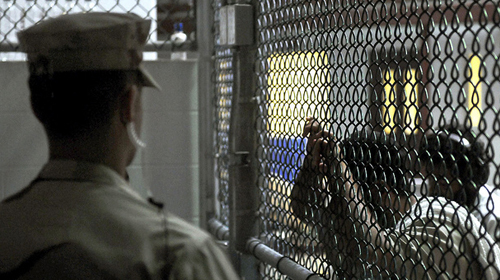Guantánamo: A Betrayal of Our Values, a Human Rights Crisis, and Expensive as Hell


The House Armed Services Committee just voted to approve HR 1960, otherwise known as the National Defense Authorization Act for Fiscal Year 2014. Among the myriad national security issues that compete for attention in this bill is the prison at Guantánamo Bay, which Congressman Adam Smith (D-WA) has repeatedly characterized as an “international eyesore.” It is, of course, also a human rights disaster.
In Guantánamo, 104 men are on hunger strike to protest their indefinite detention. Forty-one are being force-fed through tubes, and four have been hospitalized. As President Obama himself said recently in a speech at the National Defense University, this is a prison that should never have been opened.
Yet while this moral and rights crisis continues to heat up, it may well be the fiscal crisis that boils over. According to Congressman Smith, who offered an amendment to lift the ban on transfers of detainees to the United States for detention and trial, it costs American taxpayers a whopping $1.6 million per detainee at Guantánamo – nearly 50 times the cost of holding inmates in federal Bureau of Prisons facilities.
Unfortunately, Congress didn’t get it. The amendment was rejected by a vote of 23-38, which means that unless the President begins the process of transferring detainees out of Guantánamo and the prison is closed, Americans will ultimately have to foot the bill to maintain Guantánamo into the foreseeable future. This will require the construction of permanent facilities on the island. According to funds appropriated in the proposed bill, that will cost an additional $61 million beyond the amount requested by the Department of Defense, making for a grand total of $247.4 million that could be approved to make permanent a prison that virtually everyone agrees must be closed.
In response to this exorbitant price tag, Congressman Robert Andrews (D-NJ) offered an amendment eliminating the proposed increase and effectively barring the construction of permanent facilities at Guantánamo. Additionally, the Andrews amendment makes all funding for Guantánamo contingent upon Congress receiving a full report on the complete historical and future costs. As Congressman Andrews said, it makes no sense to “pay bills now and ask questions later.” The committee rejected this amendment as well, approving instead a revised version (also known as a “perfecting amendment”) offered by Congressman Whitman (R-VA), which does not strike the additional funding and retains only a superficial reporting requirement.
If Congress approves this funding, starting next year we will be paying close to 100 times as much to house detainees in Guantánamo as we do inmates in federal prisons in the United States, at a rate of roughly $3 million per detainee. Even in a time of budget surplus, let alone our current financial crisis, that ought to make all of us – and especially lawmakers – take a pause. As Congressman Smith pointed out last week, our maximum security facilities have successfully housed convicted felons – as well as individuals convicted of acts of terrorism, including Richard Reid (the “shoe-bomber”) and Zacarias Moussaoui – without posing any of the dangers that Dick Cheney and others predicted.
For 12 years, the existence of Guantánamo has deprived the men held there of their human rights, chipping away at our moral standing in the world, our relationships with our allies, and the foundations of our system of justice, which demand that the only people who should be deprived of their liberty are those who have been charged, tried, and found guilty of a crime in federal criminal court. All others should be sent home, or to another country if there is any danger of torture or abuse.
These reasons alone more than justify closing the prison without delay. The financial burden only adds to those imperatives. It is time we ask ourselves how much we are willing to pay to perpetuate a human rights crisis and indefinitely detain 166 men – 86 of whom have already been cleared for transfer – and some of whom may literally be dying to be free.
Learn more about Guantánamo Bay and other civil liberty issues: Sign up for breaking news alerts, follow us on Twitter, and like us on Facebook.

